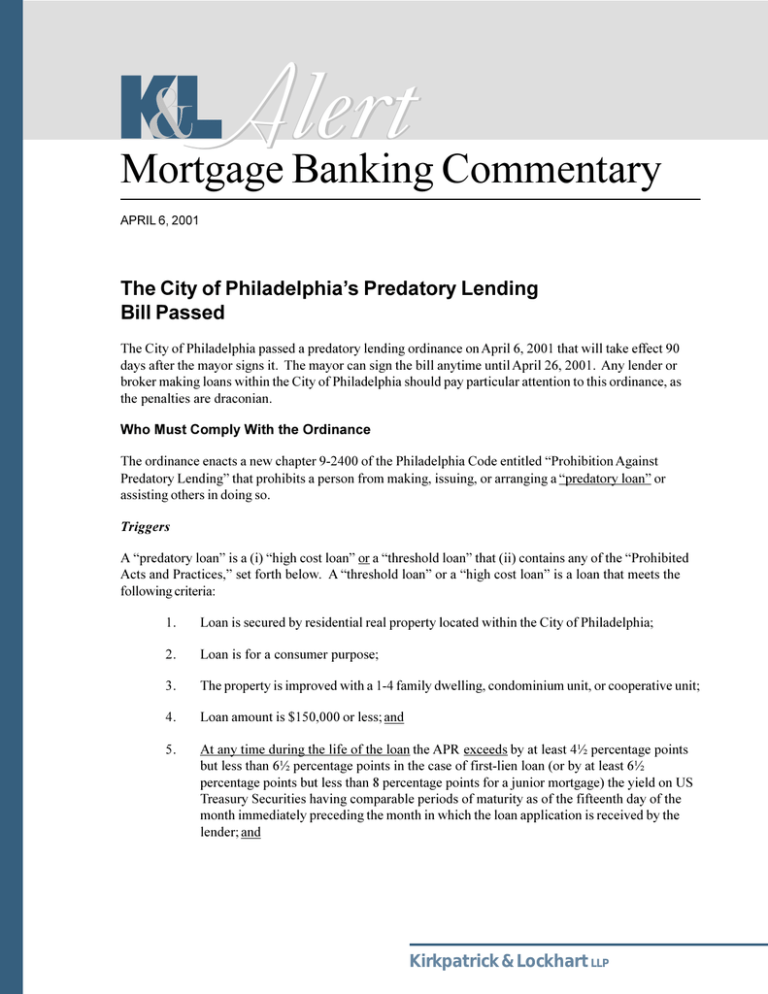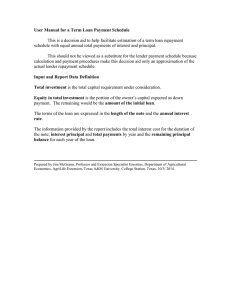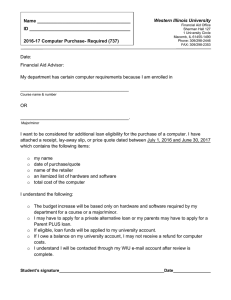
A lert
Mortgage Banking Commentary
APRIL 6, 2001
The City of Philadelphias Predatory Lending
Bill Passed
The City of Philadelphia passed a predatory lending ordinance on April 6, 2001 that will take effect 90
days after the mayor signs it. The mayor can sign the bill anytime until April 26, 2001. Any lender or
broker making loans within the City of Philadelphia should pay particular attention to this ordinance, as
the penalties are draconian.
Who Must Comply With the Ordinance
The ordinance enacts a new chapter 9-2400 of the Philadelphia Code entitled Prohibition Against
Predatory Lending that prohibits a person from making, issuing, or arranging a predatory loan or
assisting others in doing so.
Triggers
A predatory loan is a (i) high cost loan or a threshold loan that (ii) contains any of the Prohibited
Acts and Practices, set forth below. A threshold loan or a high cost loan is a loan that meets the
following criteria:
1.
Loan is secured by residential real property located within the City of Philadelphia;
2.
Loan is for a consumer purpose;
3.
The property is improved with a 1-4 family dwelling, condominium unit, or cooperative unit;
4.
Loan amount is $150,000 or less; and
5.
At any time during the life of the loan the APR exceeds by at least 4½ percentage points
but less than 6½ percentage points in the case of first-lien loan (or by at least 6½
percentage points but less than 8 percentage points for a junior mortgage) the yield on US
Treasury Securities having comparable periods of maturity as of the fifteenth day of the
month immediately preceding the month in which the loan application is received by the
lender; and
Kirkpatrick & Lockhart LLP
A high cost loan has all of the attributes of a threshold loan plus the following additional criteria must
be satisfied:
6.
(a) At any time during the life of the loan the APR equals or exceeds by more than 6½
percentage points for a first-lien loan (8 percentage points for a junior loan) the yield on
US Treasury Securities having comparable periods of maturity as of the fifteenth day of
the month immediately preceding the month in which the loan application is received by the
lender; or
(b) the total points and fees financed in such loan equal or exceed (a) 4 percentage
points of the total loan amount less the amount of such points and fees if the loan amount is
$16,000 or greater; or (b) $800 if the loan amount is less than $16,000.
Note that a threshold loan or high cost loan could be a first- or subordinate-lien, open- or closed-end
loan, including purchase-money or refinance. As noted above, the APR must be below the threshold rate
at all terms during the life of the loan. Thus, for an ARM loan, a lender must look beyond any teaser
rate, and determine the fully indexed rate. Under the Points and Fees Test, the critical issue is the
amount of points and fees financed, rather than the total points and fees charged on the loan. Finally,
note that loans in excess of $150,000 are outside the scope of the ordinance.
Prohibited Acts and Practices
As indicated above, a predatory loan is a threshold loan or high cost loan loan that was made
under circumstances that involve any of the following acts or practices, or involve any of the following
loan terms:
2
1.
Fraudulent or deceptive acts and practices, including fraudulent or deceptive marketing
and sales efforts to sell high cost loans;
2.
Loan Flipping, which is the making of a threshold loan or high cost loan to a
borrower that refinances an existing loan secured by residential property in the City of
Philadelphia when any of the following characteristics exist: (i) more than 50% of the prior
debt refinanced bears a lower interest rate than the new loan unless the advisability and
appropriateness of the new loan is certified by a counselor employed by a housing
counselor agency approved by the Office of Housing and Community Development; (ii)
the borrowers payment of prepaid finance charges and closing costs reduces the interest
rate such that it will take more than 5 years for the borrower to recoup the transaction
costs; or (iii) refinancing a special mortgage originated, subsidized or guaranteed by or
through a state, tribal or local government, or nonprofit organization, which bears either a
below-market interest rate, or has nonstandard payment terms beneficial to the borrower,
such as payments that vary with income, are limited to a percentage of income, or where
no payments are required under specified conditions, and where, as a result of the
refinancing, the borrower will lose one or more of the benefits of the special mortgage;
3.
Balloon payments a loan that contains a scheduled payment that is more than twice as
large as the average of earlier scheduled payments or which contains a provision that
gives the lender, in its sole discretion, the right to accelerate the indebtedness in the
absence of the default of the borrower;
4.
Negative amortization;
5.
Prepayment penalties;
Kirkpatrick & Lockhart LLP
6.
Financing of points and fees in excess of 4 percentage points of the total loan amount less
the amount of such points and fees if the loan amount is $16,000 or greater, or $800 if the
loan amount is less than $16,000;
7.
Increased interest rate after default;
8.
Advance payments in which more than two periodic payments required under the loan are
consolidated and paid in advance from the loan proceeds provided to the borrower other
than a loan issued by or guaranteed by the Commonwealth of Pennsylvania;
9.
Modification or deferral fees;
10.
Mandatory arbitration;
11.
Financing of any credit life, credit disability, credit unemployment or any other life or health
insurance, directly or indirectly, into one or more high cost loans;
12.
Lending without home loan counseling - the making, issuing or arranging of any threshold
loan or high cost loan, or assisting others in doing so is prohibited without first receiving
notice from a counselor employed by a housing counseling agency approved by the Office
of Housing and Community Development that the borrower has received counseling on the
advisability of the loan transaction and the appropriateness of the loan; or
13.
Lending without due regard to repayment - for borrowers whose reported income is no
greater than 120% of the median family income for the Philadelphia Metropolitan
Statistical Area, it is prohibited for a lender to make, issue or originate any threshold loan
or high cost loan if the lender does not reasonably believe at the time the loan is
consummated that the borrower(s) will be able to make the scheduled payments to repay
the obligation based upon a consideration of their current and expected income, current
obligations, employment status, and other financial resources (other than the borrowers
equity in the dwelling which secures repayment of the loan).
Exemptions
The prohibition on making, issuing or arranging predatory loans, or assisting others in doing so, does not
apply with respect to a licensed lender (presumably to include lenders licensed under the Mortgage
Bankers and Brokers Act, the Secondary Mortgage Loans Act or Consumer Discount Company Act)
solely because of the presence of a loan term allowing for a balloon payment, negative amortization, or
prepayment penalty if the loan is made pursuant to the Alternative Mortgage Transactions Parity Act (21
USC 3803) and such loan is not otherwise a predatory loan. Moreover, the prohibition does not apply
in the case of a loan made pursuant to the Secondary Mortgage Loan Act or the Consumer Discount
Company Act solely because the loan contains a provision authorized by the respective Act, provided that
the loan is not otherwise a predatory loan.
A partial exemption from the ordinance is available for a state-chartered bank, bank and trust company,
savings bank, private bank or national bank, a state or federally chartered savings and loan association, a
federally chartered savings bank or a state or federally chartered credit union. This exemption expressly
does not extend to affiliates of any of the above-mentioned entities.
The financial institutions listed above are exempt from any of the following four limitations: (i) making,
issuing or arranging predatory loan, or assisting others in doing so; (ii) lending without home loan
counseling; (iii) lending without due regard to repayment; and (iv) payments to home improvement
contractor.
3
Kirkpatrick & Lockhart LLP
Obligations Imposed by the Ordinance
Among other provisions, the ordinance requires a certification of compliance to be recorded with the
mortgage, restricts payments to home improvement contractors and imposes limitations on awarding
contracts with the City of Philadelphia.
Certification of Compliance
Of significance, a certification of compliance appears to be required with every Philadelphia mortgage,
not just a predatory loan, high cost loan or threshold loan. Moreover, there are no exemptions
from this provision. Thus, this requirement appears to apply to every mortgage loan made by any lender
in the City of Philadelphia.
Specifically, at time of recording a mortgage the lender and, if applicable, the broker must submit a
certification of compliance to be recorded along with the mortgage instrument and deed. The
certification, in the form set forth in the ordinance and in compliance with formatting requirements from
the Philadelphia Department of Records, must indicate (i) whether the loan is a first- or subordinate-lien,
(ii) whether it is purchase money or non-purchase money; (iii) the APR; (iv) the applicable Treasury
Rate; (v) the total loan amount; (vi) the total amount of points and fees financed; (vii) the percentage of
points and fees financed; (viii) whether or not the mortgage is a high cost loan or a threshold loan;
(ix) whether the borrower received housing counseling and whether a certification of housing counseling
is attached; and (x) whether the mortgage violates any provisions of the ordinance (Chapter 9-2400 of
the Philadelphia Code). The certification also must be signed and dated by the mortgage lender or
broker and include the entities address, telephone number and Philadelphia Business Privilege License.
Payments to Home Improvement Contractors
Among other provisions, the ordinance restricts payments to home improvement contractors. First, no
more than 25% of the total proceeds of the high cost loan may be disbursed at time of closing. Second,
all home improvement disbursements made from the loan proceeds must be made (i) payable to the
borrower or (ii) at the election of the borrower, through a third-party escrow agent in accordance with
the terms established in a written agreement signed by the borrower and the home improvement
contractor prior to disbursement.
Contracts/Licensing with the City of Philadelphia
Similar to the Chicago ordinance that went into effect in November, 2000, the ordinance prohibits
persons and business entities from being awarded a contract with the City of Philadelphia or a City
agency if the person or business entity or any of its affiliates is a high cost lender or a predatory lender.
In fact, every contract with the City must contain a provision requiring that the person or business entity
with which the City is contracting certify that neither the person or business entity, nor any of its
affiliates, is a high cost lender or a predatory lender. A predatory lender or a high cost lender is a
business entity that, through itself and/or an affiliate has made, issued or arranged, or assisted others in
so doing, within any 12 month period predatory loans or high cost loans, respectively, that comprise
either: (i) 5% of the total annual number of loans made, issued or arranged or 5% of the total annual
number of loans which the business entity has assisted others in so making, issuing or arranging; or (ii)
10 individual loans or less.
4
Kirkpatrick & Lockhart LLP
Aside from enacting this new chapter, the ordinance also would amend certain sections of Philadelphias
Licenses, City depository and Investment provisions. Of note is that each City depository will be
required to provide the City with an affidavit certifying that neither it, nor any of its affiliates, is, and none
will become a high cost lender or a predatory lender. Furthermore, City depositories will be required to
provide the City with predatory lending information, which shall include, but is not limited to the market
share ratio of the depositorys refinance loans in minority census tracts in Philadelphia to non minority
census tracts in Philadelphia, and the market share ratio of the depositorys refinance loans in low and
moderate income census tracts in Philadelphia to middle and upper income census tracts, and considering
each affiliate separately in calculations.
Penalties Imposed by the Ordinance
Violations made under the ordinance are steep and could include (i) monetary fines for any person who
violates the ordinance of not less than $100 nor more than $300 per day of violation; (ii) loss of city
contracts; (iii) loss of business privilege license; and (iv) forfeiture of government funded housing
assistance. Each day in which a borrower is assessed with interest on the principal loan amount of a
predatory loan constitutes a separate violation of the ordinance.
The ordinance also empowers individuals with a private right of action if such individual became obligated
on a predatory loan.
The Director of the Office of Housing and Community Development is charged with enforcing the
ordinance. The Director will maintain a listing of those business entities which have been determined to
meet the definition of high cost lender and predatory lender and shall regularly distribute this listing to all
City agencies and City-related agencies. This listing will be made available to the public free of charge
by request of the Office of Housing and Community Development.
Please contact me at 202-778-9314 or nweissgold@kl.com should you have any questions. Thank
you.
5
Kirkpatrick & Lockhart LLP
MORTGAGE BANKING/CONSUMER FINANCE GROUP
Kirkpatrick & Lockhart LLP was founded in 1946, and, with more than 600 lawyers, is one of the
thirty-five largest law firms in the United States. K&L attorneys are based in ten offices in key US
cities Boston, Dallas, Harrisburg, Los Angeles, Miami, Newark, New York, Pittsburgh, San
Francisco, and Washington. Our firm represents a broad range of clients in a wide variety of matters,
including corporate and securities, e-commerce, investment management, insurance coverage,
financial institutions, mortgage banking and consumer finance, creditors rights, intellectual property,
tax, labor, environmental, antitrust, health care, and government contracts. More than half our
attorneys are litigators. We litigate class actions on a range of financial issues, generally defending
financial institutions, broker-dealers, public companies, and investment companies and their officers
and directors against claims of violations of securities laws, consumer credit laws, and common law
tort and contract claims. You can learn more about our firm by visiting our Internet website at
www.kl.com.
The Mortgage Banking/Consumer Finance Group provides legal advice and licensing services to the
consumer lending industry. We counsel clients engaged in the full range of mortgage banking
activities, including the origination, processing, underwriting, closing, funding, insuring, selling, and
servicing of residential mortgage loans and consumer loans, from both a transactional and regulatory
compliance perspective. Our focus includes both first- and subordinate-lien residential mortgage
loans, as well as open-end home equity, property improvement loans and other forms of consumer
loans. We also have experience in multi-family and commercial mortgage loans. Our clients include
mortgage companies, depository institutions, consumer finance companies, investment bankers,
insurance companies, real estate agencies, homebuilders, and venture capital funds. Members of the
Mortgage Banking/Consumer Finance Group and their telephone numbers and e-mail addresses are
listed below:
ATTORNEYS
Laurence E. Platt
Phillip L. Schulman
Thomas J. Noto
Costas A. Avrakotos
Melanie L. Hibbs
Jonathan Jaffe
R. Bruce Allensworth
Daniel J. Tobin
Anthony P. La Rocco
Emily J. Booth
Eric J. Edwardson
Irene C. Freidel
Suzanne F. Garwood
Steven M. Kaplan
Kristie D. Kully
Carol M. Tomaszczuk
Nanci L. Weissgold
(202) 778-9034
(202) 778-9027
(202) 778-9114
(202) 778-9075
(202) 778-9203
(415) 249-1023
(617) 261-3119
(202) 778-9074
(973) 848-4014
(202) 778-9112
(202) 778-9387
(617) 261-3115
(202) 778-9892
(202) 778-9204
(202) 778-9301
(202) 778-9206
(202) 778-9314
lplatt@kl.com
pschulman@kl.com
tnoto@kl.com
cavrakotos@kl.com
mhibbs@kl.com
jjaffe@kl.com
ballensworth@kl.com
dtobin@kl.com
alarocco@kl.com
ebooth@kl.com
eedwardson@kl.com
ifreidel@kl.com
sgarwood@kl.com
skaplan@kl.com
kkully@kl.com
ctomaszczuk@kl.com
nweissgold@kl.com
*****
THIS NEWSLETTER IS FOR INFORMATIONAL PURPOSES ONLY AND DOES
NOT CONSTITUTE LEGAL ADVICE.
6
Kirkpatrick & Lockhart LLP
DIRECTOR OF LICENSING
Stacey L. Riggin
(202) 778-9202
sriggin@kl.com
REGULATORY COMPLIANCE ANALYSTS
Dana L. Lopez
(202) 778-9383
Nancy J. Butler
(202) 778-9374
Susan C. Grassmann
(202) 778-9129
Joelle Myers
(202) 778-9093
Marguerite T. Frampton
(202) 778-9253
Jeffrey Prost
(202) 778-9364
dlopez@kl.com
nbutler@kl.com
sgrassmann@kl.com
jmyers@kl.com
mframpton@kl.com
jprost@kl.com
LAW CLERKS
Tara L. Goebel
tgoebel@kl.com
(202) 778-9261
Kirkpatrick & Lockhart LLP
Challenge us.
BOSTON n DALLAS n HARRISBURG n LOS ANGELES n MIAMI n NEWARK n NEW YORK n PITTSBURGH n SAN FRANCISCO n WASHINGTON
.........................................................................................................................................................................
This publication/newsletter is for informational purposes and does not contain or convey legal advice. The information herein
should not be used or relied upon in regard to any particular facts or circumstances without first consulting with a lawyer.
© 2001 KIRKPATRICK & LOCKHART LLP.
ALL RIGHTS RESERVED.





